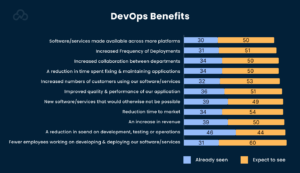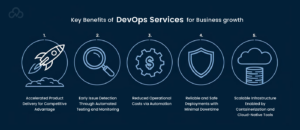Introduction
The success of present-day digital-first organizations depends heavily on the software construction methods, together with testing practices and deployment strategies. Modern business requirements for instant delivery of high-performing software that ensures absolute security surpass traditional development and operations methods. Their inefficient systems produce slowdowns that create separated teams while also slowing down new developments. DevOps services have transformed into an essential requirement that unites operational teams with development functions for joint business objective pursuit through cultural organizational change.
DevOps provides tools, but its main focus is on achieving desirable results. The system provides a methodical approach to maintain continuous bug detection and delivery, as well as ongoing system monitoring. The operational services generate concrete business advantages because they deliver quicker market entry, fewer project breakdowns, and better departmental teamwork. Decision-makers need to address the fundamental issue regarding what constitutes DevOps services.
This article clarifies each aspect, starting with DevOps service components before presenting real business benefits and guiding enterprises through effective service adoption.
What Are DevOps Services?

DevOps services represent a unified collection of practices as well as tools together with cultural approaches that unite development operations with information technology departments through automation and integration. The main objective concentrates on developing, testing, and deploying software at higher speeds coupled with superior reliability. A complete environment based on tools and workflows, together with defined role,s operates synchronously beneath the surface.
These services often include:
– Continuous integration and delivery (CI/CD)
– Infrastructure as Code (IaC)
– Monitoring and logging
– Automation and orchestration
– Configuration management
– Containerization and microservices
When businesses employ DevOps services, they cut product development lifecycles down while decreasing human mistakes and accelerating deployment cycles, and shortening response times in failure situations.
Why DevOps Services Are More Than Just a Trend
DevOps services deliver advantages that extend beyond statistical metrics to encompass other valuable results in IT projects. Faster deployment speed results in faster market entry, allowing businesses to claim superior market positions in competitive business sectors. Speed stands as a critical factor during both feature releases and critical bug fixes. Automation takes care of manual tasks that cause errors, thus enabling teams to direct their efforts toward creative solutions rather than performing maintenance duties.
DevOps fosters a culture of collaboration. Deconstructing operational walls between development groups and operational teams leads organizations to produce stronger reliable products. The alignment of cultural values in workflow management leads to high team engagement and better employee happiness, which results in exceptional work performance.
How DevOps Consulting Companies Drive Value
Every business has specialized knowledge or sufficient resources to start developing their DevOps pipeline alone. The entry of DevOps consulting companies solves this issue for businesses. The specialists at these consulting firms bring knowledgeable experience from multiple organizations to help businesses build their DevOps framework.
A reliable DevOps consultant brings actual value through the following approach:
Assessment & Roadmapping
At the beginning of their work, DevOps consultants analyze all aspects of your current workflows and infrastructure, together with your organizational problems. The evaluation stretches further than routine inspections because it analyses how process procedures match your organizational direction to discover areas that need improvement and automation possibilities. Through its analysis, the consultancy creates an individualized strategic plan that properly fits your company’s needs, making DevOps adoption both logical and adjustable.
Toolchain Integration
The core aspect of DevOps revolves around a combination of tools optimized for automation, together with collaboration support. DevOps consulting companies assist businesses in selecting and implementing vital tools that consist of Jenkins for CI/CD, GitHub for version control, together with Kubernetes for container orchestration, and Terraform for infrastructure management. The consultants build a unique toolchain framework that matches your operational processes and employee capabilities, and an infrastructure selection plan to maximize cross-team efficiency and teamwork.
Culture Building
The success of DevOps depends equally on the people who use it because it functions both technologically and humanely. Consultants drive internal transformation through their work of eliminating departmental barriers while promoting inter-team collaboration between development staff and staff in operations and QA departments. Your organization should transition to a shared goal system while promoting mutual responsibility and integrating operational values that encompass teamwork and open practices, and continuous progress. A lasting organizational success depends on the foundation of a powerful DevOps culture.
Training & Handover
Responsible consultants make it their duty to execute system implementation, followed by comprehensive training of team members before their departure. Their expertise involves direct knowledge transfer, which builds capabilities in your staff members while teaching them both technical DevOps tools and foundational principles. Every process setup and workflow gets documented comprehensively by the consultant team. The documentation serves as an organizational tool that enables team consistency through staff replacements while assuring smooth workflow continuation after the consultant’s departure.
Performance Metrics
Organizations receive assistance from DevOps consultants for developing specialized key performance indicators (KPIs) that align with their particular business targets. Implementation of KPIs should focus on deployment frequency and lead time for changes, as well as mean time to recovery and overall system uptime. Monitoring performance indicators in real time enables organizations to assess DevOps implementation effectiveness as well as locate system blockages that support declarative-based choices for optimizing performance and reliability rates.
Key Benefits of DevOps Services for Business Growth

Transforming IT operations with DevOps extends its business advantages beyond traditional information technology practices. The services delivered by DevOps directly boost business value through these specific mechanisms:
1. Speeded-up product deliveries through faster releases provide businesses with a competitive advantage to serve their customers and adapt to market developments.
2. Automated testing, together with continuous monitoring, helps identify issues that are detected before the end of the product development process.
3. Organizations using automation technology need fewer human workers, which results in substantial operational cost savings over time.
4. Safe deployments become possible because rapid iteration and one-step rollback functions cause service outages to decrease.
5. Containerization and cloud-native tool,s together with DevOps, enable complete scalability of both applications and infrastructure.
DevOps Consultant vs. In-House Team: Which Is Right for You?
Many companies struggle with the decision of whether to hire a full-time team or bring in a DevOps consultant. There’s no one-size-fits-all answer, but here’s a breakdown to help guide the choice:
|
Factor |
In-House Team |
DevOps Consultant |
|
Cost |
Higher long-term cost |
Lower upfront cost |
|
Speed |
Slower to implement |
Faster execution |
|
Expertise |
May lack depth in tools |
Deep, specialized knowledge |
|
Scalability |
Good for long-term growth |
Ideal for initial setup or troubleshooting |
In most cases, businesses benefit from starting with a consultant to build the foundation and then transitioning to an internal team for ongoing support.
Real-World Examples of DevOps Services at Work
The following section examines business outcome improvements that different organizations achieve through DevOps principles.
1. Through DevOps, Spotify implemented its “squad” structure to permit self-directing teams to build code independently, which they then tested and deployed at a large scale.
2. The deployment mechanisms coupled with chaos engineering tools at Netflix guarantee constant operational continuity regardless of extreme operating environments.
3. Airbnb achieved a better user experience, together with faster deployment times, by implementing automated testing and CI/CD.
The unique requirements of each company brought substantial rewards after they customized their DevOps systems.
What to Look for in DevOps Consulting Companies
The process of picking suitable external support requires thorough research to ensure quality delivery. Some essential characteristics you should evaluate in potential external assistance include the following:
1. Experience in your industry should be present in their work portfolio. Every sector, including healthcare and fintech, together with e-commerce, operates under distinct requirements.
2. The team members should demonstrate exceptional competence in utilizing modern DevOps tools, especially Docker and Kubernetes, alongside Prometheus and Ansible.
3. Check testimonials and case studies. A reputable DevOps consulting company will present a portfolio that demonstrates its worth.
4. Your teammates need to be comfortable with the consultant because their working methods need to match how your team functions together.
Common DevOps Pitfalls to Avoid
Businesses can face implementation challenges even though DevOps produces evident advantages. Various standard implementation pitfalls which one must watch out for include:
– Timeouts on organizational culture change cannot replace needed adjustments in team dynamics because isolated workforces remain unchanged.
– Not all processes require automation at every stage. Choose wisely.
– Security must always be a part of DevSecOps implementation since it protects the entire pipeline infrastructure and data.
– Lack of proper guidelines in documentation leads to disorganized handovers that create a higher chance for mistakes to occur.
FAQs
1. What are DevOps services, and why are they important for business growth?
Software delivery experiences improved efficiency through the combination of development methods with operations procedures known as DevOps services. Companies operate better with DevOps services because these services improve delivery speed while reducing mistakes and enable faster scaling, which results in pleased customers and profit growth potential.
2. How do DevOps consulting companies help with implementation?
DevOps consulting companies perform current workflow evaluations before suggesting needed tools and leading teams. These companies offer complete support, starting from systems development strategy through the execution of hands-on implementation work.
3. What’s the difference between a DevOps consultant and an in-house DevOps team?
The role of a DevOps consultant provides temporary expert guidance regarding your DevOps pipeline setup and difficulties, but they must work alongside an internal team that manages regular development and operational tasks. Establishments requiring fast implementation should use consulting services, while organizations that need sustained support need their internal teams.
4. Is DevOps only suitable for large enterprises?
Not at all. Both startup enterprises and small businesses obtain equal value from DevOps service implementation.
Final Thoughts: DevOps as a Business Enabler
DevOps functions as more than an information technology methodology because it enables business operations. Through DevOps, companies gain the ability to provide enhanced business value that arrives earlier and requires fewer risks, as well as fewer manual processes. Companies that use DevOps services achieve market success through their flexible operations and consistent structure, and reliable response capabilities. Businesses should unite development with operations to build innovation with security and speed up their market response while maintaining superior quality and user satisfaction.
Selecting the correct approach for DevOps implementation through building an internal team or hiring a professional consultant builds lasting business achievement. An approach to DevOps that is customized will help organizations align their business objectives with their tools and processes, as well as their human resources. Technological development transforms the companies that maintain adaptive practices and integrated best practices into leaders instead of mere survivors. The slow adoption of modernization among companies permits their more agile competitors to surpass them when DevOps stands as the central pillar of their digital methods.
Do you like to read more educational content? Read our blogs at Cloudastra Technologies or contact us for business enquiry at Cloudastra Contact Us.